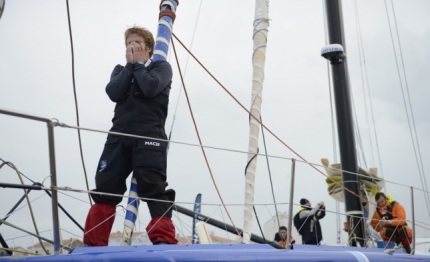IN EVIDENZA
j24 fincantieri nauticsud open skiff finn america's cup campionati invernali meteor foiling dragoni optimist luna rossa fiv convegni class 40
VENDÉE GLOBE
Vendée Globe: François Gabart, MACIF, winner

redazione
François Gabart’s Vendée Globe is a story of transformation. In a little less than 80 days, the young skipper, viewed as a talented outsider, he evolved turned into a race leader, successfully keeping the other competitors at bay. A spectacular start From the outset of the race, François Gabart set about upsetting the order. He took the lead in the Bay of Biscay, imposing his fast pace and sailing in a style akin to the French short course solo racing circuit, the Solitaire du Figaro skipper than a long-distance sailor. The weather conditions favoured the front runners, who soon extended their lead. It took them three days to reach the Madeira latitude, where the first strategic choices were made, followed by Armel Le Cléac’h storming into the front. 4-way match Sailing down the South Atlantic after a complicated the doldrums confirmed the situation, that the race was dominated by a leading quartet featuring Armel Le Cléac’h, Vincent Riou, Jean-Pierre Dick and François Gabart leaving Bernard Stamm and Alex Thomson in their wake. As they reached the Roaring Forties, the skippers ahead picked up the pace, resulting in a series of amazing performances. On November 30, François Gabart broke the first 24-hour distance record (482.91 miles). Shortly, after Vincent Riou was forced to abandon and three skippers - Jean-Pierre Dick, Armel le Cléac’h and François Gabart – entered the Indian Ocean together as a tight pack while Bernard Stamm, ranked fourth, lurked behind. The great escape On December 10, the MACIF skipper drove the point home by setting the ultimate solo distance record on a monuhull, covering 545 miles in twenty-four hours. Armel Le Cléac’h was the only one able to hold on and the two Frenchmen, positioned at the front of the fleet, built up an impressive gap in only a few days. On December 13, Jean-Pierre Dick was 155 miles behind. 24 hours later, the gap had increased to 300 miles and eventually 500 miles on December 15. The Southern Ocean adventure then turned into a spectacular duel in which the two solo sailors were rarely more than twenty miles apart. At one point within visual contact on several occasions. François Gabart returned to the Atlantic on January 1, securing the 2012-2013 Vendée Globe edition a place in the history book as the first race in which a rookie rounded Cape Horn as the race leader. François’ trick Leaving the Le Maire Straights behind them, the two frontrunners laboured through a windless hole and Gabart managed to slightly widen the gap, sailing forty miles ahead. On January 5, Le Cléac’h broke the union for the first time since the Amsterdam gate and tacked west his sights set on a ridge of weather. François Gabart kept sailing along his eastern route, taking him to the edge of the Saint Helena high. Demonstrating his strategic acumen, Gabart extended his lead and positioned himself back in front of the Banque Populaire bow. He crossed the Equator five days ahead of Michel Desjoyeaux’s record. Despite a tricky Doldrums crossing, Gabart kept warding off Le Cléac’h’s attacks throughout his climb back up the North Atlantic. At 29, as he crossed the finish line, he became the youngest Vendée Globe winner ever. Alain Gautier was 30 years old when he won the 1992-1993 edition in 110 days and 2 hours. What a difference a decade makes. Key figures Longest distance covered in 24 hours: December 10, 545 miles at an average speed of 22.7 knots. Maximum gap between MACIF and Banque Populaire: © VINCENT CURUTCHET / DPPI / Vendée Globe
Number of rankings with Gabart leading: (5 rankings a day): 234
Days spent leading the race: 44 days 20 hours
Les Sables to Equator: 11 days 00 hours 20 min (Jean Le Cam’s 2004-2005 record: 10 days 11 hours 28 min)
Equator to Good Hope: 12 days 03 hours 25 min (JP Dick’s record: 12 day 02 hour 40min)
Good Hope to Cape Leeuwin: 11 days 06 hours 40 min (new record)
Cape Leeuwin to Cape Horn: 17 days 18 h 35mn (new record)
Cape Horn to Equator: 13 days 19 hours
Equator to Les Sables: 12 days 01 hour 37 minutes
Banque Populaire to MACIF: 263.14 miles on November 28
MACIF to Banque Populaire: 273.99 miles on January 14
27/01/2013 19:00:00 © riproduzione riservata
Tweet
CORRELATI
DELLA SETTIMANA
Come lavorare per l'America's Cup a Napoli
Annuncio ufficiale del portale dedicato alla registrazione di tutte e sole aziende e fornitori locali interessati a collaborare con il soggetto privato ACE Italy S.r.l., la società responsabile dell'organizzazione della Louis Vuitton 38a America's Cup
Meteor: a Napoli il "Trofeo del Timoniere"
I colori, i profumi e il mare di Napoli saranno lo scenario del Trofeo del Timoniere, primo appuntamento nazionale 2026 dedicato ai Meteor che si svolgerà nel weekend del 21 e 22 febbraio
Meteor: il Cimento Invernale lo vince Miseria Nera
Il campionato si chiude a terra: festa, convivialità e verdetti confermati. Sul gradino più alto Miseria Nera di Pierantonio Acquaviva, Luca Bertoli e Carlo Lazzaroni
Invernale Napoli: domenica in acqua a Torre del Greco
Domenica primo febbraio Trofeo Città Torre del Greco al Circolo Nautico torrese. Cinquanta imbarcazioni al via della quinta tappa del Campionato invernale del Golfo di Napoli
Luna Rossa sponsor ufficiale della FIV
Luna Rossa e la Federazione Italiana Vela (FIV) annunciano una nuova collaborazione per accompagnare e sostenere le squadre olimpiche, giovanili e parasailing italiane in vista delle Olimpiadi di Los Angeles 2028
Open Skiff, torna l'arbitraggio in acqua
Torna l'arbitraggio in acqua nelle regate della classe giovanile Open Skiff: approvata dalla Federazione Italiana Vela la Normativa 2026, con la nuova Policy Internazionale
Optimist: prime regate a Genova dell’International Genoa Winter Contest
Si è concluso a Genova il primo appuntamento stagionale dell’International Genoa Winter Contest, organizzato dallo Yacht Club Italiano e dedicato alla classe Optimist, che ha visto la partecipazione di oltre 150 atleti suddivisi nelle Divisioni A e B
Invernale Napoli: a Torre del Greco una giornata da incorniciare
È stata una giornata divertente, con il golfo pieno di barche; una bellissima scenografia con un vento costante con picchi di 14 nodi. Which Way, Raffica e Pestifera i vincitori delle regate organizzate dal Circolo Nautico Torre del Greco
Venezia: alla Compagnia della Vela affascinante serata con Sir Robin Knox-Johnston
"Tutto il mondo per me": l'icona mondiale della vela Sir Robin Knox-Johnston si racconta alla Compagnia della Vela
Foiling Awards IX, si vota fino al 20 febbraio
Nelle varie categorie a rappresentare l’Italia ci saranno Maddalena Spanu, Federico Bergamasco, Riccardo Pianosi, Mattia Cesana, il PoliMi Sailing Team (Politecnico di Milano), il Moth Worlds sul Garda e la Foiling Week a Malcesine
